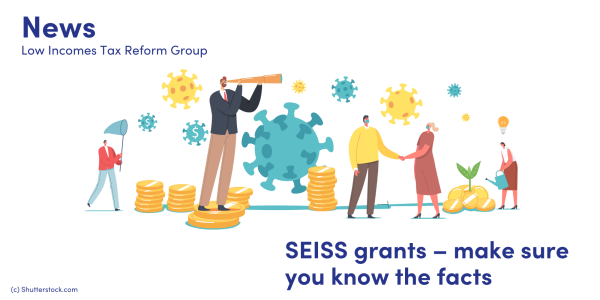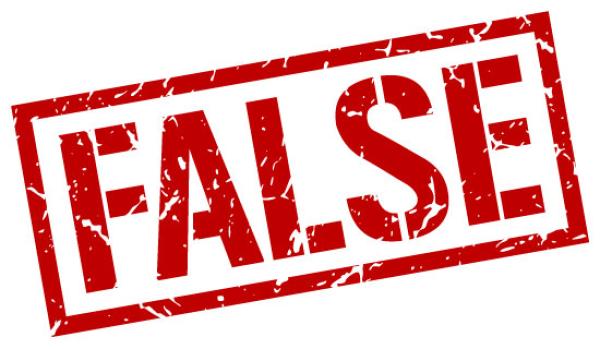SEISS grants – make sure you know the facts
Nearly three million self-employed individuals or partners in partnerships claimed one or more of the five self-employment income support scheme (SEISS) grants during the coronavirus pandemic. We are aware there’s a great deal of confusion about these grants, including in the media, so this article busts some myths about SEISS grants and helps you understand your position with HMRC.

Content on this page:
MYTH 1: SEISS grants are not taxable

This is false. The SEISS grants are taxable income.
Most people will need to report the first three SEISS grants, if claimed, on their 2020/21 Self Assessment tax return. We explain how you do this at SEISS: where do I include the grants on my tax return?.
You will owe income tax on these grants if, together with your other taxable income, you exceed the personal tax allowance (£12,500 for 2020/21). You will also owe Class 4 National Insurance contributions on the grants if your trading income, including the grants, exceeds the Lower Profits Limit (£9,500 for 2020/21). As the grants are included in working out your taxable income, it may mean that you need to pay Class 2 National Insurance contributions for the year if you didn’t already. All this may mean you have a higher tax bill than you were anticipating.
You cannot use the trading allowance against the SEISS grants.
If you claimed the fourth and/or fifth SEISS grants, then these will need to be included on your 2021/22 tax return. When the 2021/22 tax return is available we will update our guidance to explain where these grants will need to be included.
As long as you were entitled to receive the grants, you do not need to repay them back to HMRC. They are not loans. However, if you were not entitled to receive the grants, you will need to pay them back. You can also voluntarily repay some or all of the grants.
If you were not eligible for the grant – for example, you incorporated your self-employment business and are now trading though a company instead – then HMRC may have already contacted you about your SEISS grants (see below).
If you have not been contacted by HMRC but realise that you have incorrectly claimed the grants then you will still need to repay any overpaid grants. Our guidance explains what you need to do, how you repay the grants and potential penalties for not notifying HMRC in time.
MYTH 2: My circumstances changed after I claimed the SEISS grant, so I will have to pay it back

Provided you were eligible for the grant when you claimed it, this is FALSE for grants paid in 2020/21 (that is, the first three grants). There is a separate rule for the fourth and fifth grants, paid in 2021/22 (see below).
The rules or eligibility criteria were different for the different SEISS grants. If you want to check if you were eligible to claim the SEISS grants then we cover all the eligibility conditions on this table on our SEISS webpage.
⚠️ The important thing to remember is that you needed to have met the eligibility conditions AT THE TIME you made the claim.
Example 1
For example, it may be the case that you intended to continue your self-employment business when you claimed the first and second SEISS grants but afterwards you were offered employment and decided to cease trading. You were still eligible to claim the first two SEISS grants because at the time of making the claims you had intended to continue trading in 2020/21, it was only later that you decided to stop your self-employment. So, in this case you would not need to repay the first two SEISS grants (assuming you met all the other relevant eligibility conditions).
Example 2
It may be the case that your business had a number of contracts cancelled between May and October 2020, so you claimed the first and second SEISS grants as you met all the eligibility conditions. However, your business was very successful from November 2020 onwards so over the 2020/21 tax year you have higher profits than usual. This does not mean you should not have claimed the first and second SEISS grants, because at the time of claiming these grants your business had been adversely affected.
Because some of the eligibility conditions are based on facts at the time the grant claims were made it is important that clear business records are kept showing the position at the time each SEISS grant was claimed.
So, following on from the first example above, it would be helpful to have business records showing that you intended to continue trading when you claimed the first two SEISS grants – this may be customer bookings for later in the year which you subsequently cancelled when you stopped trading.
For the second example, HMRC may ask you for evidence that your business was adversely affected when claiming the first and second SEISS grants, for which you could show them emails or letters cancelling jobs which were booked between May and October 2020.
For the fourth and fifth grants only, if you have amended your tax return(s) on or after 3 March 2021 and you are no longer eligible for these SEISS grants, or you are eligible for a lower amount, then you may need to contact HMRC to repay some or all of the grants. We explain this in more detail on our SEISS guidance.
MYTH 3: My grant claim was correct, so I can ignore any letters from HMRC about the grants

This is FALSE.
HMRC are contacting some SEISS grant claimants to check their eligibility to one or more grants. If you have been contacted by HMRC then you should firstly check that the correspondence is genuine. Unfortunately there are a number of sophisticated scams which try to impersonate HMRC. GOV.UK lists genuine HMRC contacts and you should check here or contact HMRC if you are unsure.
You should not put off replying to HMRC about your SEISS grants. It could be the case as in the examples above that your claims were valid but based on other information, such as details on your tax return, HMRC have decided they need to check the facts surrounding your claim. For example, it may be the case that you stated on your 2019/20 tax return that you had stopped your self-employment – this may have been a mistake, or you had stopped one trade but began another new unincorporated business and so were still eligible to claim the SEISS grants.
You should provide information HMRC ask for to verify your grant claims but do not hesitate to ask for extra help if you need it. This could be from HMRC’s Extra Support Team, or if you are on a low income, TaxAid.
If you realise that you were not eligible for one or more of the SEISS grants then you should contact HMRC as instructed in their correspondence. You will need to repay the grant income you should not have received and you may have to pay a penalty. There is further guidance on this and the deadline to repay the grants here.
MYTH 4: HMRC haven’t written to me about my grant, so I know I won’t need to pay any of it back

This is FALSE.
HMRC have already contacted some people about their SEISS grant claims, but they will continue to check claims. Just because you haven’t received a letter so far doesn’t mean HMRC agree that you were eligible for your SEISS grants. HMRC are carrying out a number of different checks in relation to the SEISS grants so even if you have not been contacted about your grants yet that does not mean you will not be asked for more information in the future.
Even if HMRC never contact you about your claim(s), this does not mean that HMRC have decided you were definitely eligible for the grants. The law requires you to disclose incorrectly claimed grants to HMRC (usually on your Self Assessment tax return). If you do not do so, particularly if you do not do so knowingly, then you may face penalties in addition to having to pay back the grant. Interest would also be payable.
As explained above, for most people the first three SEISS grants need to be included on their 2020/21 Self Assessment tax return and the fourth and fifth grants on their 2021/22 tax return. HMRC can ask questions regarding eligibility for the grant(s), as well as the grant amount (in particular for the fifth grant), under the ‘usual’ Self Assessment enquiry rules.
It is therefore important to keep any business records which back up your SEISS claims. We cover the time-limits on keeping records at What business records should I keep?.
MYTH 5: I don’t need to declare my SEISS grant for tax credits or universal credit

This is FALSE. SEISS grants count as income for both tax credits and universal credit (UC).
If you claim tax credits then we understand that the first three SEISS grants should be included as part of your trading income figure for your 2020/21 tax credit claim. The fourth and fifth SEISS grants should be included as part of trading income for your 2021/22 tax credits claim. We explain more in our SEISS guidance and at SEISS: where do I include the grants on my tax return?.
If you claim UC then we understand there was a separate SEISS grant box to include the grants on your monthly online form. By including the grants here, this would mean that the grants are treated as part of your self-employed earnings when calculating your monthly UC payment. There is more information in our SEISS guidance.
